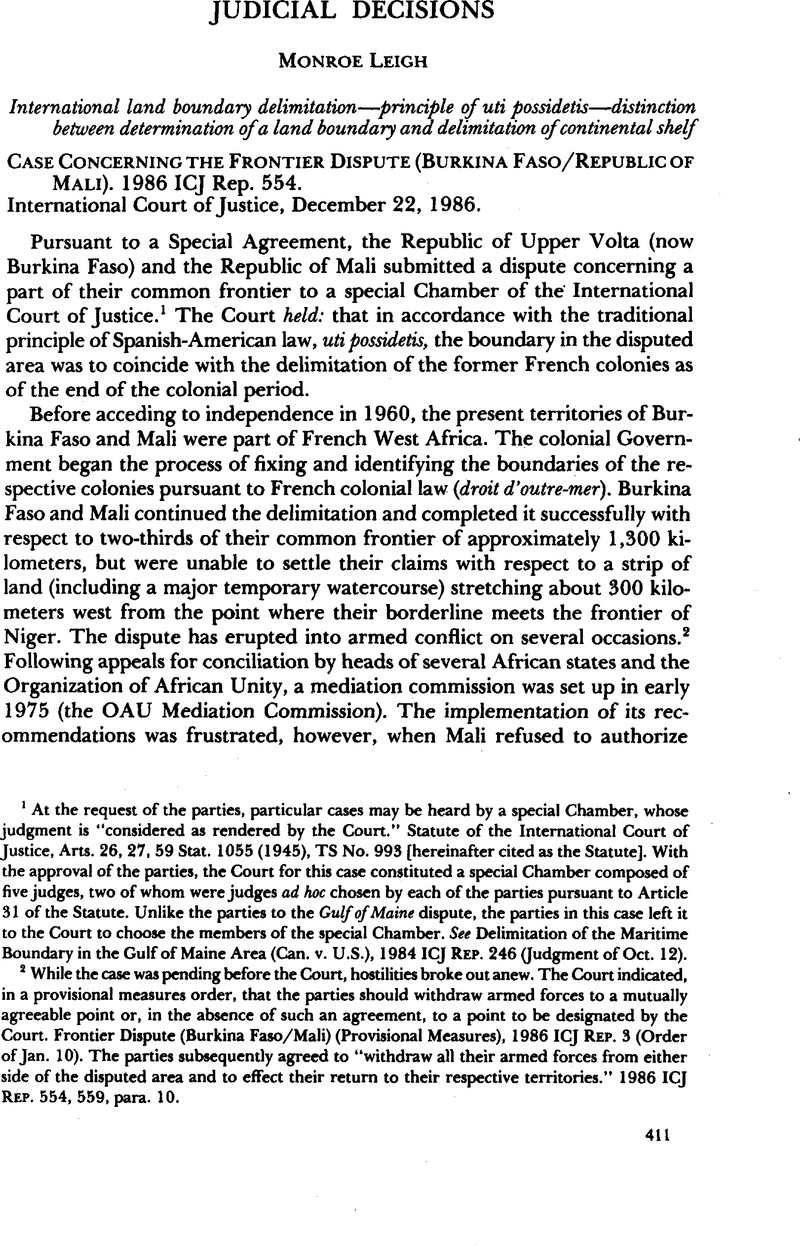Published online by Cambridge University Press: 27 February 2017

1 At the request of the parties, particular cases may be heard by a special Chamber, whose judgment is “considered as rendered by the Court.” Statute of the International Court of Justice, Arts. 26, 27, 59 Stat. 1055 (1945), TS No. 993 [hereinafter cited as the Statute]. With the approval of the parties, the Court for this case constituted a special Chamber composed of five judges, two of whom were judges ad hoc chosen by each of the parties pursuant to Article 31 of the Statute. Unlike the parties to the Gulf of Maine dispute, the parties in this case left it to the Court to choose the members of the special Chamber. See Delimitation of the Maritime Boundary in the Gulf of Maine Area (Can. v. U.S.), 1984 ICJ Rep. 246 (Judgment of Oct. 12).
2 While the case was pending before the Court, hostilities broke out anew. The Court indicated, in a provisional measures order, that the parties should withdraw armed forces to a mutually agreeable point or, in the absence of such an agreement, to a point to be designated by the Court. Frontier Dispute (Burkina Faso/Mali) (Provisional Measures), 1986 ICJ Rep. 3 (Order of Jan. 10). The parties subsequently agreed to “withdraw all their armed forces from either side of the disputed area and to effect their return to their respective territories.” 1986 ICJ Rep. 554, 559, para. 10.
3 Special Agreement for the Submission to a Chamber of the International Court of Justice of a Frontier Dispute, Sept. 16, 1983, Mali–Upper Volta (now Burkina Faso), preamble, reprinted in 22 ILM 1252, 1253 (1983); see also 1986 ICJ Rep. at 557, para. 2.
4 1986 ICJ Rep. at 556, para. 23. The Court also noted that the principle, when it first appeared in the process of decolonization of Spanish America in the early 19th century, was also designed for a second purpose, namely, to assert that there was no territory without a sovereign in order to fend off any claims of other colonial powers. See also Separate Opinion of Judge Abi-Saab, id. at 659, 661, para. 13 (Abi-Saab, J. ad hoc).
5 1986 ICJ Rep. at 565, para. 20.
6 Id.
7 Statute, supra note 1, Art. 38.
8 1986 ICJ Rep. at 567, para. 28 (relying on Continental Shelf (Tunisia v. Libyan Arab Jamahiriya), 1982 ICJ Rep. 18 (Judgment of Feb. 24); Fisheries Jurisdiction (UK v. Ice.; FRG v. Ice.), 1974 ICJ Rep. 3 and 175 (Judgments of July 25)).
9 1986 ICJ Rep. at 568, para. 30.
10 See Continental Shelf (Libyan Arab Jamahiriya v. Malta), 1985 ICJ Rep. 13 (Judgment of June 3); North Sea Continental Shelf Cases (FRG/Den.; FRG/Neth.), 1969 ICJ Rep. 3 (Judgment of Feb. 20).
11 Here the Court relied on Continental Shelf, 1985 ICJ Rep. 13; Nuclear Tests (Austl. v. Fr.; NZ v. Fr.), 1974 ICJ Rep. 253 and 457 (Judgments of Dec. 20); Northern Cameroons (Preliminary Objections) (Cameroon v. UK), 1963 ICJ Rep. 15 (Judgment of Dec. 2).
12 Nuclear Tests, 1974 ICJ Rep. 253 and 457.
13 1986 ICJ Rep. at 582–83, para. 55.
14 Id. at 662, para. 14 (Abi-Saab, J. ad hoc, sep. op.).
15 Judge ad hoc Abi-Saab would have preferred a solution “more deeply impregnated with considerations of equity infra legem in the interpretation and application of law, given that the region concerned is a nomadic one, subject to drought, so that access to water is vital.” Id. at 633, para. 17.
16 See Messages from the President of Burkina Faso and the President of Mali to the President of the International Court of Justice, dated respectively Dec. 24, 1986 and Jan. 10, 1987, ICJ Communiqué No. 87/1, Jan. 16, 1987.